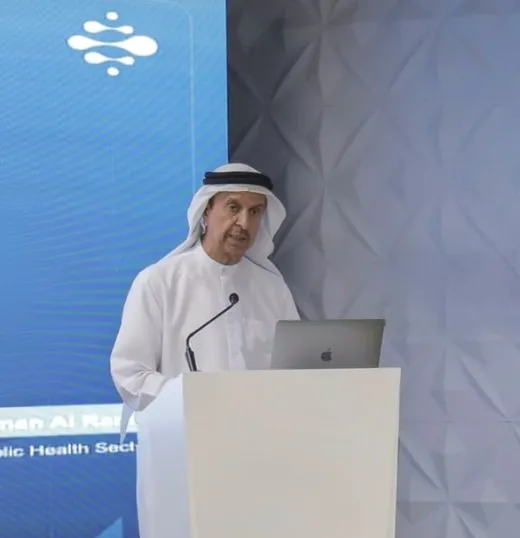The Ministry of Health and Prevention (MoHAP) has announced the outcomes of its transformational initiative, “Your Pulse,” a national system for the early detection of cardiovascular disease risk, along with the results of the 2023-2024 National Campaign for Early Detection of Hypertension.
The two programs aim to support the UAE government’s strategy of fostering a new institutional culture that embraces change and aligns with the country’s future needs.
They also aim to facilitate a swift, adaptive response to global trends across key sectors, in addition to building an effective, integrated partnership model for achieving strategic goals.
The results were announced during an event hosted by the Ministry in Dubai, in collaboration with strategic partners from government, private, and telecommunications sectors. Partners included Emirates Health Services, the Department of Health-Abu Dhabi, Dubai Health, American Hospital, Mediclinic, Life Pharmacies, and United Medical Centre, as well as the Telecommunications and Digital Government Regulatory Authority, e&, du, and several medical academic institutions across the UAE.
Present at the event were Dr. Hussain Abdul Rahman Al Rand, Assistant Under-Secretary for the Public Health Sector, Dr. Nada Al Marzouqi, Director of the Public Health and Prevention Department; Dr. Buthaina Bin Belaila, Head of the Non-Communicable Diseases and Mental Health Section; and representatives from various participating organisations.
The Ministry of Health and Prevention reported that “Your Pulse” project successfully reached 95% of attendees at health care and periodic examination centres within government health authorities, covering 80% of the target demographic. The project has implemented an early intervention system for individuals aged 40 and above who are at high risk, providing medical advice and essential treatments.
Additionally, a standardised protocol for calculating the Framingham Cardiovascular Risk Score has been adopted across all government health facilities in the country. This protocol, linked to national and global health indicators, aims to reduce the mortality rate from cardiovascular diseases by 33% by 2030.
Meanwhile, the results from the National Campaign for Early Detection of Hypertension, conducted between June and August 2023-2024, revealed participation from over 70,000 citizens and residents. The campaign identified 13.2% of participants as being aware of their hypertension and actively receiving treatment, with 4% being newly diagnosed cases. The campaign also noted correlations between hypertension, obesity, physical inactivity, and all forms of smoking.
Dr. Hussain Al Rand highlighted that the results of “Your Pulse” project and the national campaign for early detection of hypertension will significantly support the government’s innovative strategies, which employ short-term, sector-specific transformation cycles that depend on projects and real results, shifting from the traditional ministry-led initiatives to collaborative actions by government task forces.
This approach not only focusses on the central role of transformative projects in future government work but also aims to build a healthier and more sustainable future for coming generations in line with “We the UAE 2031” Vision.
He highlighted that the UAE has positioned itself as a global leader in healthcare, relentlessly enhancing the quality of life by adopting best health practices and developing an integrated, sustainable health system.
Al Rand stressed that ensuring cardiovascular health will help reduce premature mortality. And this can be achieved by promoting prevention, early diagnosis, and advanced healthcare for all.
The results will also contribute to shaping future health policies, directing resources in line with anticipated health needs, and building a sustainable society where everyone enjoys a high quality of life, he further said.
For her part, Dr. Buthaina outlined the national plan to combat non-communicable diseases, emphasising the importance of prevention and control based on international best practices and scientific evidence.
The ministry, in collaboration with its partners, has developed a national plan to manage preventive and community health programs aimed at enhancing quality of life on a national scale. The plan focusses on building the skills of healthcare professionals and educating the public on maintaining a healthy lifestyle, which includes regular physical activity, eating nutritious food, reducing salt intake, and quitting smoking.
Dr. Buthaina highlighted that this approach represents an institutional commitment to reducing the spread of disease and improving national health outcomes, in line with the strategic goals of sustainable development programs.

